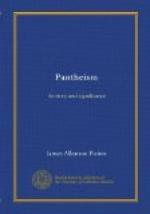This result Is additionally secured by the increasing incongruity felt between the immeasurable vastness of the Universe, even as known, and the idea of creation out of nothing. When the Almighty could be seriously pictured as constructing chambers for Himself and His heavenly host above, the middle floor of earth for the children of men, and the abyss for ghosts and devils, the notion that His word evoked that puny structure from nothing might be invested by poets and prophets with a certain grandeur. Each part of the work had an object as conceivable as that of each floor in a house; and, according to petty human notions of utility, nothing was wasted. But now, when our astronomers confront us with countless millions of orbs, to whose extension In space no bound can be proved, while some of them tell us that the whole immensity is a desert of alternate fire and darkness, with no spark of finite intellect except in our tiny earth, some of us, at least, cannot help feeling that the notion of a personal divine worker calling this huge enigma out of blank eternal nothing, is enormously and utterly incongruous both with reverence and common sense.
And if the Pantheist in these days be asked, “What interpretation then do you propose?” his answer is, “I propose none. I take things as they are. In their totality they are unknowable, as, indeed, even science finds they are in their infinitesimal parts.” But we need not on this account lose “the divinity that shapes our ends.”
[Sidenote: Pantheistic Morality.]
[Sidenote: The Law of the Whole.]
For, between the infinite and the infinitesimal the human experience realizes itself in surroundings which, when observed and reflected on, make the impression of ordered relations of parts. By a necessity of our finite and individual existence as centres of action—a necessity of which we can give no account—we present those relations to ourselves in forms of time and space. Then, when our experience is large enough and ripe enough, being enriched and stimulated by the stored-up experience of humanity, as recorded in tradition, custom, Bibles, and Epics, we attain to the moral sense, and realize that we are bound to be loyal to something greater than self. That “greater” may be the tribe, the nation, humanity or God. But in far the larger number of cases in which this sense of willing loyalty is aroused, its cause is the appeal to us of some whole of which we form a part. Certainly this is so with the patriot and the philanthropist. Indeed, it would be difficult, or impossible, to find any human relationship, from the family upwards, through the wider circles of school, club, municipality, nationality, in which this sense of loyalty or devotion to the law of the whole is not the best incentive to devotion.
[Sidenote: Of that Law of the Whole Loyalty to God in the Supreme Application.]




